By: debbie lynn eilas
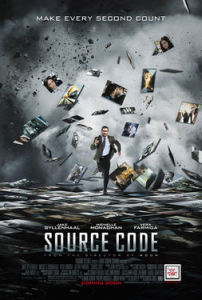
Duncan Jones took the filmmaking world by surprise last year with a little indie gem called MOON. Blending science, technology, philosophy and ethical/religious mores and taboos, he wowed us, not only entertaining us, but sparking our minds and post-viewing discussions. Jones now returns with SOURCE CODE, a mind-bending Pandora’s box of entertainment, philosophy, technology, quantum physics, parallel universes, government warfare and the age-old question of where does humanity – and humanness – begin and end. Written by Ben Ripley and directed by Jones, in short, SOURCE CODE is pure brilliance. What starts out as a seemingly innocent “Groundhog Day” rehash in dramatic form as opposed to comedy, quickly becomes a dynamic, psychological thriller that probes the conscience of the audience as to technology, science, warfare and the ethics of life and death. The story is extremely well written with suspicions, questions, twists and turns and well constructed characters, but is fully cohesive and comes full circle bringing us to the dawn of a new era…perhaps a new interpretation of survival of the fittest. And beyond it’s words, SOURCE CODE is a tremendous visionary film from an aesthetic standpoint.
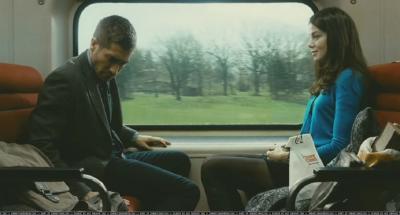
Captain Colter Stevens is a decorated war hero. Shot down in Afghanistan, he is lost and alone in an encapsulated pod. He struggles to recall what happened.
Captain Colter Stevens also finds himself on a train, groggy from sleep, awakening to find a beautiful woman named Christina sitting across from him calling him Sean, Sean Fentress. The only problem is that he doesn’t know who she is or what he’s doing on this train. He was just on a mission. Trying to jog his memory or wake up from a nightmare, he goes to the lavatory to splash some cold water on his face. But his face is not who he sees in the bathroom mirror. He sees the face of Sean Fentress.
As Colter struggles to come to grips with that is happening, after 8 minutes the train explodes into a raging fireball. All signs of life are gone…except for Colter Stevens, wakes up in his pod, completely disoriented and confused. A calm, soothing female voice can be heard, “Captain? Captain? Are you with us Captain Stevens? Some confusion is normal. Captain Stevens? Who is the bomber?”
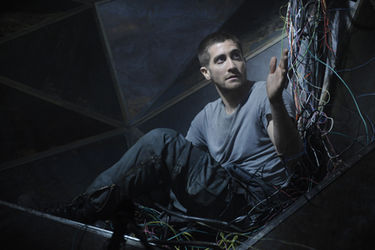
Slowly the pieces of the puzzle begin to unfold. This is the SOURCE CODE. The brain child of Dr. Rutledge, the SOURCE CODE is a form of time travel that utilizes the last few moments of a post-mortem of a person, to travel through time into a parallel universe into that person’s sub-conscience and relive the last eight minutes of their life. Because of his “exceptional qualifications”, Captain Stevens is one of the few selected for the program. His mission is now to find a bomber on the Chicago train; a bomber who after blowing up the train is planning to blow up Chicago. Placed in the SOURCE CODE, Stevens must go back in time and replay those final eight minutes of Sean Fentress’ life and find the bomber so Rutledge and crew can get the information to the Feds and stop an apocalypse.
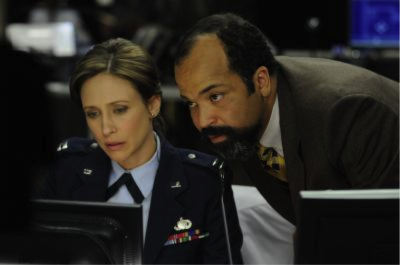
Serving as Steven’s only connection to the SOURCE CODE is his supervisor, Captain Colleen Goodwin. A good soldier, Goodwin is faced with her own crisis of conscience as Stevens needs more than just following her orders. He needs answers. Answers to explain not only the SOURCE CODE but how it affects the world – his world; the world in which his father lives and his friends live, the world in which he is engaged in tangible combat, the world that he loves. However, with the onslaught of multiple rapid returns to the eight minute world of Sean Fentress, Stevens is becoming connected to that world as well. His fate will come to lie in the heart of Colleen Goodwin.
What can one possibly say about Jake Gyllenhaal that hasn’t been said before? His performance as Colter Stevens is beyond reproach. It is flawless. As Stevens, Gyllenhaal continues with his ‘everyman that is the only man’ persona that he began in Prince of Persia. One look at him in character and you know the wheels are turning, struggling to follow the rules of command but with an overriding human need for answers. With each 8 minute journey, and those intervening returns to the pod and contact with Vera Farmiga’s Goodwin, Gyllenhaal rivets you to the screen. You feel his confusion, his frustration, his sorrow, his joy, his humanity. He brings the audience onto that train with him, into that pod. According to Gyllenhaal, “The interesting thing about this movie is that the character was a perfect parallel with the story and where the audience was. So wherever he was, the audience is going to see the movie through his eyes. Whatever he discovers, the audience is discovering, too.”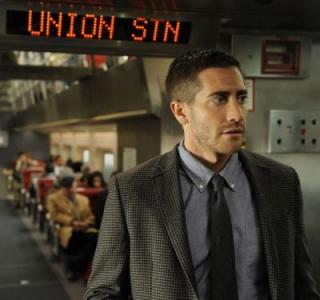
“First and foremost, I need to know that the science works, at least conceptually, logical[ly], that the idea to made sense and that I bought it. So often movies like this tend to be laughed at in sort of an absurdist way. And this one made sense. That idea that within the last 8 minutes of somebody’s life there would be electro-impulses or within 8 minutes after they supposedly died, there would still be electrical impulses that you could usurp and use. It made sense to me thinking of being a scientist, coming up with a computer program that allowed that connection between one body connected to another body within that period of time. It [also] began to bring up a lot of interesting questions. I also need to know when [Goodwin] starts to explain to me what the SOURCE CODE is, I could have a response that I could not believe and then have to belief.”
Vera Farmiga stuns us yet again with another fascinating nuanced performance as Captain Goodwin. Cold and robotic, Goodwin’s humanity and heart, and belief in a better world shine through thanks to Farmiga’s nuanced facial expression. Her eyes speak volumes, especially critical, given that Goodwin is only seen in a monitor headshot. Describing her experience on SOURCE CODE as “dancing by yourself. . .there’s just me and the camera. . .[this was] an interesting exercise because as actors we spend most of our time ignoring that big black piece of machinery and this is tearing down that fourth wall and staring it in the barrel of the lens. It’s a bit jarring…when you look it in the face and use it as a scene partner. And I thought, ‘Well, what if I just look at my reflection of myself?’ It at least gives me some sort of focal point. But then I thought, my eyes are crossing too much so let’s not do this. You get used to the format. And it was appropriate for the scene.”
One luxury for Farmiga was that she was able to shoot her scenes in order, making it “easier to keep track of the arc of your character. My character starts off very rigid and operating from a logical, cerebral head space. She’s a soldier after all, this captain in the Air Force, in charge of a mission to save Chicago, to save many lives. And there’s an urgency, so she’s gonna treat it like a science project that she’s been trained to do. As she makes a personal connection, she becomes personally involved…develops a tenderness, a respect and an admiration for Jake’s [Gyllenhaal] character. Then her job becomes harder to do. It was easier to keep track of that.”
On the flip side of the coin, Farmiga “felt sequestered. There’s not much movement. Even the dialogue is expository. It’s maddening for an actor to do in a nuanced way. I generally have to find the role compelling for an audience to find it compelling. That was the challenge of the role because on the written page she’s quite mission oriented. So what to me as an actress I found most fascinating the character is not so much what she said, as what she doesn’t say. It’s a good exercise for an actor. An exercise in subtlety and precision of thought because I knew my face was the only thing that would be there in the camera in the way that an eye shot will distort you as you go.”
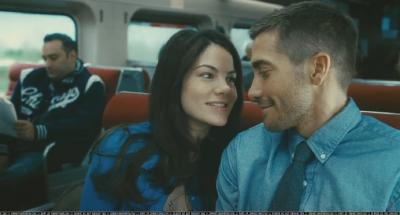
And then you toss in Michelle Monaghan as Christina. The nuanced differences she brings to each “revisit” to the train are beautifully executed. And noticeable is that with each return to 8 minutes by Colter/Sean, Christina’s attitude and persona also become more human.
Written by Ben Ripley and directed by Duncan Jones, SOURCE CODE is masterful on multiple levels. Spellbinding in concept, the story is thought provoking, fascinating, exciting, nail-biting. Characters are well written. The eight minute revisits to the train are so meticulously fine tuned and then just explode with nuanced performance by Gyllenhaal and Monaghan. Technically, the film is beyond reproach. Lensing is sharp, crystalline, razor edged which serves as a nice contrast to the underlying human story unfolding. Color pops “in reality” and is desaturated in the “pod” and military base, serving as a key to the celebration of life. Effects and editing for the jump to source code sequences is breathtaking. Although not shot in 3D, the HD work of DP Don Burgess makes the sequences so powerful, just being in the audience, one feels as if being physically pulled into the eight minutes with Colter Stevens.
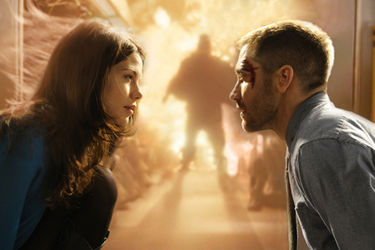
A very collaborative film, Jones worked very closely with Gyllenhaal from pre-production through post-production. “Jake and I decided early on before we even started shooting, that what we wanted to do with the script was to lighten the tone and inject some humor into it. There was some in there but it took itself quite seriously a lot of the time and we thought, ‘No, there’s such a crazy sci-fi conceit that it seemed better to set up the bones of it, set up the rules at the start, and then ask the audience to take a leap of faith and go with it.’ I think the tone of the film is what really helps the audience just accept it and go with the entertainment value of the story. So, when we started shooting, we were really trying to find that tone. And the first thing we shot was the interior of the train with Michelle and Jake and all of the extras. We really sort of played with it and the brief was quite open. We started off as the script was and then we took it funnier and weirder and weirder and funnier and some of them were probably left on the cutting room floor, but the fact that we had those different variations meant that when Paul Hirsch, who was the editor I was working with, and I were able to start cutting it together, we really did have the ability to change the tone over the course of things. It was great to have that flexibility in the cut.”
Jones seemed destined to helm SOURCE CODE. “Sci-fi was kind of my candy growing up. My dad thought it was always very important that I read an hour or two every night. If I got stuck or I just didn’t want to read, sci-fi was kind of the thing that he would give me to spur me on to read that evening; whether it was short stories or George Orwell’s ‘Animal Farm’…so that’s kind of where I started. And then obviously, I’m a big film buff as well, and [my dad] introduced me to a lot of sci-fi films that I became enamored with. I watched the German version of Baron Munchhausen and Fritz Lang’s ‘Metropolis’ at a young age. And then watched, obviously Star Wars” was the huge thing when I was a kid. And as I got older, I got interested in slightly more thoughtful and challenging sci-fi. Things like Philip K. Dick and William Gibson and J.D. Ballard and eventually came out with ‘Moon’ and then had the opportunity to work on Ben’s [Ripley] fantastic script and do SOURCE CODE.”
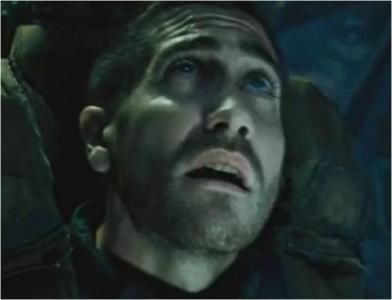
As he did with MOON, Jones, together with screenwriter Ripley, tackle concepts few dare to imagine let alone address. And he does it with thought provoking objectivity that fires the synapses and the heart. It seems fated that Jones was meant to direct SOURCE CODE. “There are some really interesting ideas which have been covered in different ways in other science fiction films and comedies – “Groundhog Day”, science fiction like “Quantum Leap”, time travel like “12 Monkeys”. There’s a lot of it that’s been covered. But I think what Ben Ripley’s done and what I really love about it is that he’s drawn together all of these ideas and put it in this engine, this fast-paced entertainment, and through the amazing performance we have, we’ve been able to inject it with this humor. It’s just a great piece of entertainment. I’m really proud of it. It’s fun to watch and as you can see, there’s a little bit of discussion that you can have at the end of it if you choose to.”
Dare to enter the SOURCE CODE.
Colter Stevens – Jake Gyllenhaal
Captain Goodwin – Vera Farmiga
Christina – Michelle Monaghan
Dr. Rutledge – Jeffrey Wright
Directed by Duncan Jones. Written by Ben Ripley.












